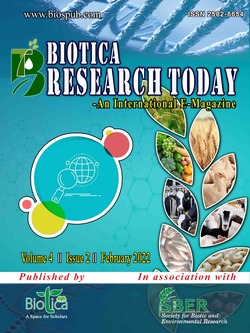
Application of Nanotechnology in Weed Management
Madhab Kumar Datta*
Dept. of Agronomy, Faculty of Agriculture, Sri Sri University, Sri Sri Vihar, Cuttack, Odisha (754 006), India
Rasmirekha Pattnaik
Dept. of Agronomy, Faculty of Agriculture, Sri Sri University, Sri Sri Vihar, Cuttack, Odisha (754 006), India
Sahuji Bandyopadhyay
Dept. of Agronomy and Agroforestry, MS Swaminathan School of Agriculture, Centurion University of Technology and Management, Odisha (761 211), India
DOI: NIL
Keywords: Emulsion, Nanocarriers, Nanoherbicides, Sensors
Abstract
Nanoherbicides being smaller in size and posessing large surface area : volume ratio are more potent than the synthetic herbicides. Micro emulsions of herbicides protects them from being degraded from various sources hence increase their residual activity. Nanocarriers help in slow and gradual release of herbicide molecules thereby increasing their efficiency. Herbicide sensors can trace the entry, movement and metabolism of herbicides in plant. Although the nanoherbicides are ecologically, socially and economically more advantageous than the synthetic herbicides still more extensive research is needed to be done in this field to have a clearer understanding about their field level response and impact on ecosystem.
Downloads
not found
Reference
Gogos, A., Knauer, K., Bucheli, T., 2012. Nanomaterials in plant protection and fertilization: Current state, foreseen applications, and research priorities. Journal of Agriculture and Food Chemistry 60, 9781-9792.
Jia, J.L., Jin, X.Y., Liu, Q.L., Liang, W.L., Lin, M.S., 2016. Preparation, characterization, and intracellular imaging of 2,4-Dichlorophenoxyacetic acid conjugated gold nanorods. Journal of Nanoscience and Nanotechnology 16, 4936-4942.
Kanjana, D., 2015. Potential applications of nanotechnology in major agricultural divisions – A Review. International Journal of Agricultural and Environmental Biotechnology 8, 699-174.
Pereira, A.E.S., Grillo, R., Mello, N.F.S., 2014. Application of poly (epsilon-caprolactone) nanopraticles containing atrazine herbicide as an alternative technique to control weeds and reduce damage to the environment. Journal of Hazardous Matter 268, 207-215.
Shaner, D., 2014. Herbicide Handbook. 10th Edition. Weed Science Society of America, USA, p. 513.
